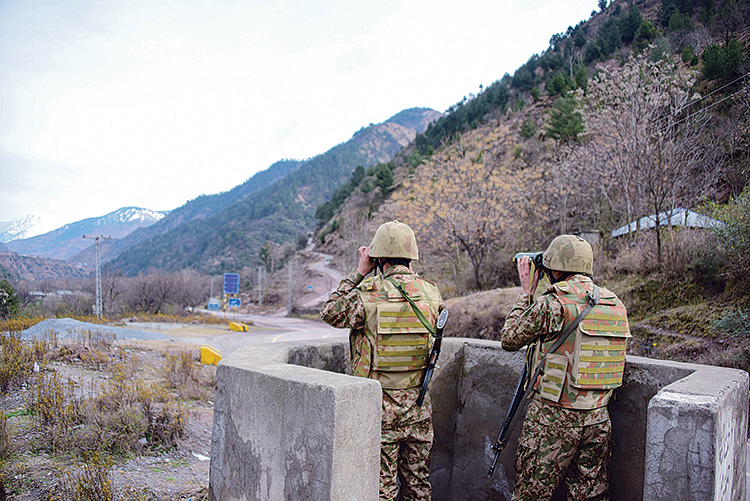
SRINAGAR: Indian
troops and police have detained more than 160 separatist leaders and activists,
mainly from the Islamist party Jamaat-e-Islami (JeI), over two successive
nights of raids in disputed Kashmir and imposed new curbs on freedom of
movement. The crackdown in towns and villages follows a suicide car bombing
that killed 40 Indian paramilitary police in a military convoy on Feb. 14
claimed by another group, the Pakistan-based Jaish-e-Mohammed (JeM).
Police say they
are rounding up separatists to head off trouble ahead of a general election
that must be held by May. Authorities detained 60 more people from the
Jamaat-e-Islami late on Saturday or early yesterday, in addition to more than
100 the previous night, said a senior police officer who asked not to be
identified.
"Since JeI
has a wider network across Kashmir and they are mobilizing anti-India protests,
their arrest could help in curbing such protests ahead of elections," he
told Reuters. The authorities have also been detaining JeM militants,
sympathizers and relatives since the attack. Separatists called for a strike to
protest against the detentions and the crackdown. In response, many shops,
petrol stations, and businesses closed, with fewer people and vehicles on
streets in sensitive areas, except for troop patrols.
In some areas of
the main city of Srinagar, the government clamped down on the movement of
people and vehicles. "The restrictions have been imposed as a
precautionary measure to avoid any untoward incident," police said in a
statement. There was also at least one military operation during the day.
Troops cordoned off Turigam, a village in South Kashmir's Kulgam district, and
in a subsequent gun battle with JeM militants, one police officer and one
militant died, a police source said. At least two other militants were trapped
inside the village, the source said.
Fuel supplies low
The government of
Jammu and Kashmir issued a statement saying that fuel supplies are critically
low in the Kashmir Valley and rationing has been introduced. It said there is
only enough gasoline for one day, diesel for four days and no liquefied
petroleum gas (LPG). The government said it will seek to increase supplies to
the region and that shortages are the result of road blockages after the
suicide bomb attack.
In the same
statement, state Governor Satya Pal Malik called on residents not to believe
"rumors of any extreme nature". The government said that an increase
in police numbers in the region was to prevent candidates and voters from being
intimidated into not standing or voting in the general election. Indian
paramilitary troops in riot gear arrived in strength at first light, said
Shakeel Ahmad, a resident of Nowhatta in the Srinagar district.
"At places,
they have blocked the main roads with steel barricades and concertina
wire," he said. Separatist leader Mirwaiz Umar Farooq, who chairs the
region's Hurriyat Conference, said arbitrary arrests and jailing of leaders,
activists and young people for their political beliefs has happened across
Kashmir for 30 years. "Intimidating activists and leadership will not
deter them from their path, nor will it stop people from demanding the
resolution of the Kashmir dispute through self-determination," he said.
Those detained
include JeI's leader, Abdul Hamid Fayaz, and Yasin Malik, the head of the Jammu
Kashmir Liberation Front that also wants independence. Reuters' telephone calls
to the Indian home ministry's media and communications department and Home
Minister Rajnath Singh's residence to seek comment went unanswered.
Tensions raised
The suicide bomb
attack has raised tensions between the nuclear-armed neighbors that both claim
Kashmir in full but rule it in part. India blames Pakistan for harboring
militant groups operating in Kashmir, which Pakistan denies. After the attack,
India dropped trade privileges for Pakistan and is preparing to send as many as
10,000 more troops to the contested area, according to a home ministry letter
seen by Reuters.
Kashmir is likely
to be a key election issue, distracting from concerns about how Prime Minister
Narendra Modi and his Bharatiya Janata Party have managed the economy. Modi has
promised a strong response to the attack, saying in a monthly radio broadcast
yesterday that it had caused anguish to victims' families and all of India.
"This attack has filled us with angst and pain and these emotions are
shared by the people of the world and those who believe in humanity," Modi
said. "Within 100 hours of the attack, our soldiers have given them a
befitting reply." Modi added that the army had vowed to destroy the
militants and those who helped them.
Islamabad has
warned it would respond with "full force" if attacked. India's
Supreme Court will hear a case next week seeking to drop a constitutional
provision that bars non-residents from moving to the state of Jammu and Kashmir
that encompasses the Muslim-majority region. If passed, it could further
escalate tension there. - Reuters











